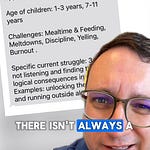Friday musings about an episode of Thomas & Friends where Henry is bricked up for not being productive enough and the dehumanizing & hurtful language parents are grappling with.
When our kids were little, we inherited a massive tub of Thomas the Train tracks from our nephews. They were moving on to bigger things, and we got the wooden windfall. Naturally, we watched a lot of Thomas, from the classic stop-motion days to the newer, CGI versions. But there’s one episode that has always stuck with me – and not in a good way.
It’s called The Sad Story of Henry. In this episode, Henry, a green engine, refuses to come out of a tunnel because he’s afraid of the rain. He doesn’t want to ruin his paint, and despite the pleas of the Fat Controller (Sir Topham Hatt) and various passengers, he holds his ground. The response? They literally brick him into the side of a mountain. They strip the tracks, lay bricks, and entomb him, leaving him to watch the world go by in isolation – a pretty harsh consequence for not being “useful.”
And that’s the message, right?
Be useful, be productive, or be bricked up.
Contribute, or you’re cut off from the world.
The parallels to how we sometimes talk about people with different abilities hit me recently when I heard the dehumanizing language some of our countries leaders like RJK Jr. are using about autistic people.
“They’ll never pay taxes. They’ll never have a job. They’ll never get married.”
It’s not just inaccurate – it’s a brutal way to measure a person’s worth.
If the first thing that comes to mind when talking about a group of people is whether they’ll pay taxes, that says a lot more about the speaker’s priorities than it does about those they’re talking about.
It’s a mindset that reduces people to their economic output, ignoring their intrinsic worth and the diverse ways they contribute to their families, friendships, and communities.
As a pediatrician, I’ve had the privilege of working with countless autistic children and their families, and let me tell you, their lives are rich, valuable, and worthy – regardless of tax brackets or job titles. They bring so much to their families, their friendships, and their communities in ways that can’t be reduced to a paycheck or a tax return.
Henry didn’t get out of that tunnel because he suddenly became more “useful” or productive. He got out because someone decided he deserved to be a part of the community no matter his contribution.
If you’re a parent hearing this dehumanizing talk and feeling the sting of it – you’re seen, your voice matters, and your child’s value isn’t up for debate. It never has been.












Share this post